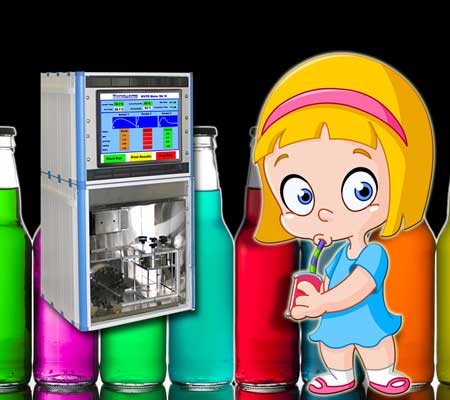Beer and Fizzy Drinks Taste Different in a Plastic Bottle and Cans

Click
on the image to download a print quality scan
This simple sounding issue not only has a real effect on quality and shelf life, but it has some complex science behind it. Fortunately it has a practical solution. The basic problem is that Carbon Dioxide seeps out through the material of a plastic bottle faster than it does through a can – and this is significantly affected by both the exact composition of the container and the lid, and also by the manufacturing process of the bottle. A thermoformed container can, for example be only a quarter as effective as the material it is made from in a flat form!
In twelve weeks a plastic bottle can lose up to 15 percent of its carbon dioxide fizz!
The only practical answer is to measure the permeability of the finished product during design and quality control stages. This helps identify trends that may prevent problems later. And this is where Versaperm can help with its latest, technology leading, permeability measurement system.
The equipment is fast and accurate and can measure the permeability each of the components separately or as a finished bottle, can or carton. Pressure and temperature can both be controlled and can measure the permeability for not just Carbon Dioxide but for non-fizzy drinks with virtually any conceivable combination of natural or modified internal atmospheres.
An array of different sensors using different physical principals, enable Versaperm's equipment to characterise an ever expanding range of materials, compounds, containers, products and laminates.
The permeability meter is highly automated and can cope with several samples at a time. It needs very little re-calibration and requires, at most, minimal training. Sensitivities depend on sensors, gases and materials but are usually in the PPM (Parts Per Million) range, PPB for some materials. Results are both accurate and highly repeatable.
Perhaps surprisingly there is a problem with drinks cans as well. Despite modern developments in can-lining, Carbon Dioxide still dissolves bits of metal through microscopic holes in the coating, which affects the flavour. Again this is caused by the permeability of the coating to CO2 and this can be measured in the same Versaperm equipment.
Please send
any sales enquiries to Christopher Roberts, Versaperm Limited ,
10 Rawcliffe House, Howarth Road, Maidenhead, Berkshire, SL6 1AP, UK, Tel: +44 1628 777668,
e.mail info@versaperm.co.uk
Web http://www.versaperm.co.uk
For further
Press Information please contact Gerry Palmer @ the Palmer & Rose
Partnership. Tel 01494 637499, fax 0871 900 3898 e.mail gerry@palmer-rose.co.uk.
|

